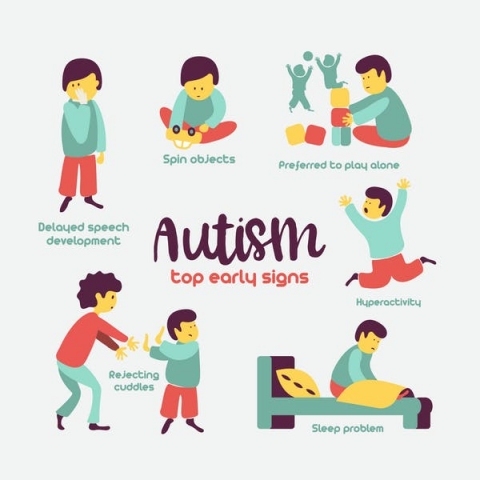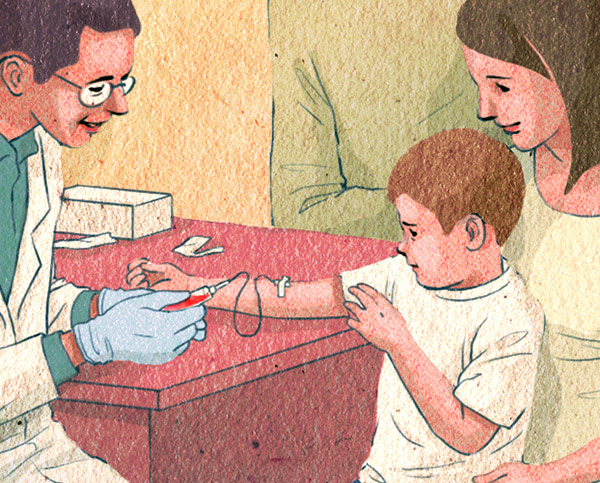Autism therapy at home can be a great way to get the most out of treatment. Some children need more intensive treatments. People can help many children with treatments that are there for them and delivered in their homes. There are a few different things you can do to make autism therapy more effective for your child when doing it at home. In this article, we will discuss some of the best ways to maximize your child’s treatment. Thanks for reading!
Contents
What Is Autism?

Autism is a developmental disorder that affects the way a person communicates and interacts with others. It can also affect how they see the world around them. ASD is an umbrella term used to describe a range of symptoms that can be different for each child. Some people with ASD may have difficulty speaking and interacting with other people. They might also have trouble with changes in routine and be sensitive to noise and lights. Also, ASD can be mild or severe, and it affects people of all racial, ethnic, and socioeconomic backgrounds.
The cause of ASD is unknown, but scientists believe it is caused by a combination of genetic and environmental factors. Research suggests that some people are born with a higher risk of developing ASD due to their genes. However, there is no one gene that causes autism. Scientists also think that certain things in the environment might increase the risk of autism. These include:
- Exposure to pollutants: Some research suggests that children who are exposed to high levels of pollutants are more likely to develop ASD.
- Exposure to viruses: Some researchers think that exposure to certain viruses before or during birth might increase the risk of autism.
- Smoking and drinking during pregnancy: Studies have shown that smoking and drinking alcohol during pregnancy can increase the risk of a child developing ASD.
- Parental age: Children whose parents are over 35 years old are more likely to develop ASD than children of younger parents.
How Is Autism Treated?

There is no one-size-fits-all approach to treating autism. The best treatment plan for a child with ASD will be tailored specifically to them and their individual needs. There are many different types of therapies that can be used to treat ASD, including:
- Behavioral therapy: This type of therapy focuses on helping children learn new skills and behaviors.
- Medication: Some children with ASD may benefit from taking medication to help manage their symptoms.
- Speech and language therapy: This type of therapy can help children who have difficulty speaking or understanding others.
- Occupational therapy: This type of therapy can help children who have trouble with everyday tasks, such as dressing themselves or using the toilet.
- ABA therapy: This type of therapy is one of the most common and intensive forms of autism treatment. It focuses on teaching children new skills and behaviors through a structured program.
- Social skills training: This type of therapy helps children learn how to interact with others.
The best type of autism therapy for your child will depend on their individual needs. Some children may benefit from a combination of different therapies, while others may do better with one specific type of treatment. Also, you should work with your child’s therapist to come up with a treatment plan that is best for them.
Can Autism Therapy Be Done at Home?
Yes! In fact, many children with ASD do better when they receive treatment in a home setting. This is because they feel more comfortable and relaxed in their own environment. There are several different types of autism therapy that can be done at home, including behavioral therapy, speech and language therapy, and occupational therapy.
Behavioral Therapy

Behavioral therapy is one of the most common types of autism therapy. It focuses on helping children learn new skills and behaviors. Behavioral therapy can be done at home with a therapist or parent-led program. There are many different behavioral programs available, so you should choose one that is best suited for your child’s needs.
Speech and Language Therapy
Speech and language therapy can help children who have difficulty speaking or understanding others. This type of therapy can be done at home with a therapist or parent-led program. There are many different speech and language programs available, so you should choose one that is best suited for your child’s needs.
Occupational Therapy
Occupational therapy can help children who have trouble with everyday tasks, such as dressing themselves or using the toilet. This type of therapy can be done at home with a therapist or parent-led program. There are many different occupational therapy programs available, so you should choose one that is best suited for your child’s needs.
ABA Therapy
ABA therapy is one of the most intensive forms of autism treatment. It focuses on teaching children new skills and behaviors through a structured program. Also, ABA therapy can be done at home with a therapist or parent-led program. There are many different ABA programs available, so you should choose one that is best suited for your child’s needs.
Social Skills Training
Social skills training helps children learn how to interact with others. This type of therapy can be done at home with a therapist or parent-led program. There are many different social skills training programs available, so you should choose one that is best suited for your child’s needs.
Play Therapy
Play therapy is a type of therapy that uses play to help children express their feelings and thoughts. This type of therapy can occur at home with a therapist or parent-led program. There are many different play therapy programs available, so you should choose one that suits the best for your child’s needs.
Floortime
This type of therapy is based on the idea that children learn best through play. It involves spending time with your child and helping them explore their interests. Music therapy uses music to help children communicate, socialize, and learn new skills.
Relationship Development Intervention (RDI)
This approach is based on the idea that relationships are key to helping children with ASD learn and grow. Also, it focuses on building meaningful relationships with your child and helping them connect with others. RDI can occur at home or in a therapy setting.
Benefits Of Treating Autism At Home

- You have more control over the therapies your child receives: You can choose the therapies that suit the best for your child’s needs and preferences.
- You can save money: Home-based therapies are often less expensive than therapies done in a clinic or hospital.
- Your child can get therapy in a familiar environment: This can help reduce stress and make treatment more effective.
- You can get help and support from other parents: There is a strong online community of parents who are raising children with ASD. This can be a great resource for information and support.
- You can tailor the therapies to meet your child’s individual needs: This will help your child get the most out of treatment.
- There is greater flexibility in terms of scheduling and location: You can choose to do therapies at home, in a clinic, or online. You also have more control over the timing and location of therapies.
- Your child can continue receiving therapy even if they move or change schools: This is a great option for families who move frequently or have children who switch schools often.
- You can build a support network with other parents who are also treating their children at home: This can be a great source of information and support.
Objectives Of Autism Therapy At Home
The objectives of autism therapy at home may vary depending on the approach that one can use. However, some common goals include:
- Helping your child learn new skills and behaviors. This may include things like communication, social skills, and self-care skills.
- Helping your child feel more comfortable and relaxed in their environment. This can help reduce stress and make treatment more effective.
- Helping your child connect with others. This is important for social development and emotional well-being.
- Helping your child feel understood and supported. This can help boost self-esteem and confidence.
- Providing a sense of continuity for your child: This can help reduce stress and make treatment more effective.
- Reducing stress and anxiety: This can be important for both your child and you.
- Building relationships with your child and others: This is key to helping your child learn and grow.
- Encouraging communication and socialization: These are important for development and well-being.
- Providing a sense of structure and routine: This can help reduce stress and make treatment more effective.
There are many different types of autism therapy available, so you should choose one that suits the best for your child’s needs. Talk to your child’s therapist to come up with a treatment plan that works best for them. You can also find helpful information and resources online or through support groups. Furthermore, with the right therapies and support, your child can reach their full potential!
Helping Someone With Autism

If you are helping someone with autism, it is important to understand what they may be experiencing. Here are some things you can expect:
- They may have difficulty communicating. This can make it difficult for them to relay what they are thinking or feeling.
- They may not understand social cues. This can make it difficult for them to interact with others.
- They may be sensitive to noise and light. This can make it difficult for them to participate in activities in public places.
- They may have trouble with self-care tasks. This can include things like bathing, dressing, and grooming.
- They may become overwhelmed easily. This can lead to stress and anxiety.
It is important to be patient and understanding when helping someone with autism. Remember that each person experiences autism differently, so what works for one person may not work for another. Be sure to ask the person you are helping what they need and how you can best support them.
Conclusion
The idea of autism therapy at home is perfect for busy parents. This option offers parents a way to spend more time with their children without having to leave work or worry about childcare during the day. Furthermore, there are many benefits to this type of intervention that you can do in your own home. Having a stay-at-home parent can help children learn important life skills. This includes how to function as an adult and also spend time with their parents. We hope our article has helped you better understand what an autism therapist might do if you decide to hire one at home!
A Word From Therapy Mantra
Your mental health — Your psychological, emotional, and social well-being — has an impact on every aspect of your life. Positive mental health essentially allows you to effectively deal with life’s everyday challenges.
At TherapyMantra, we have a team of therapists who provide affordable online therapy to assist you with issues such as depression, anxiety, stress, workplace Issues, addiction, relationship, OCD, LGBTQ, and PTSD. You can book a free therapy or download our free Android or iOS app.



